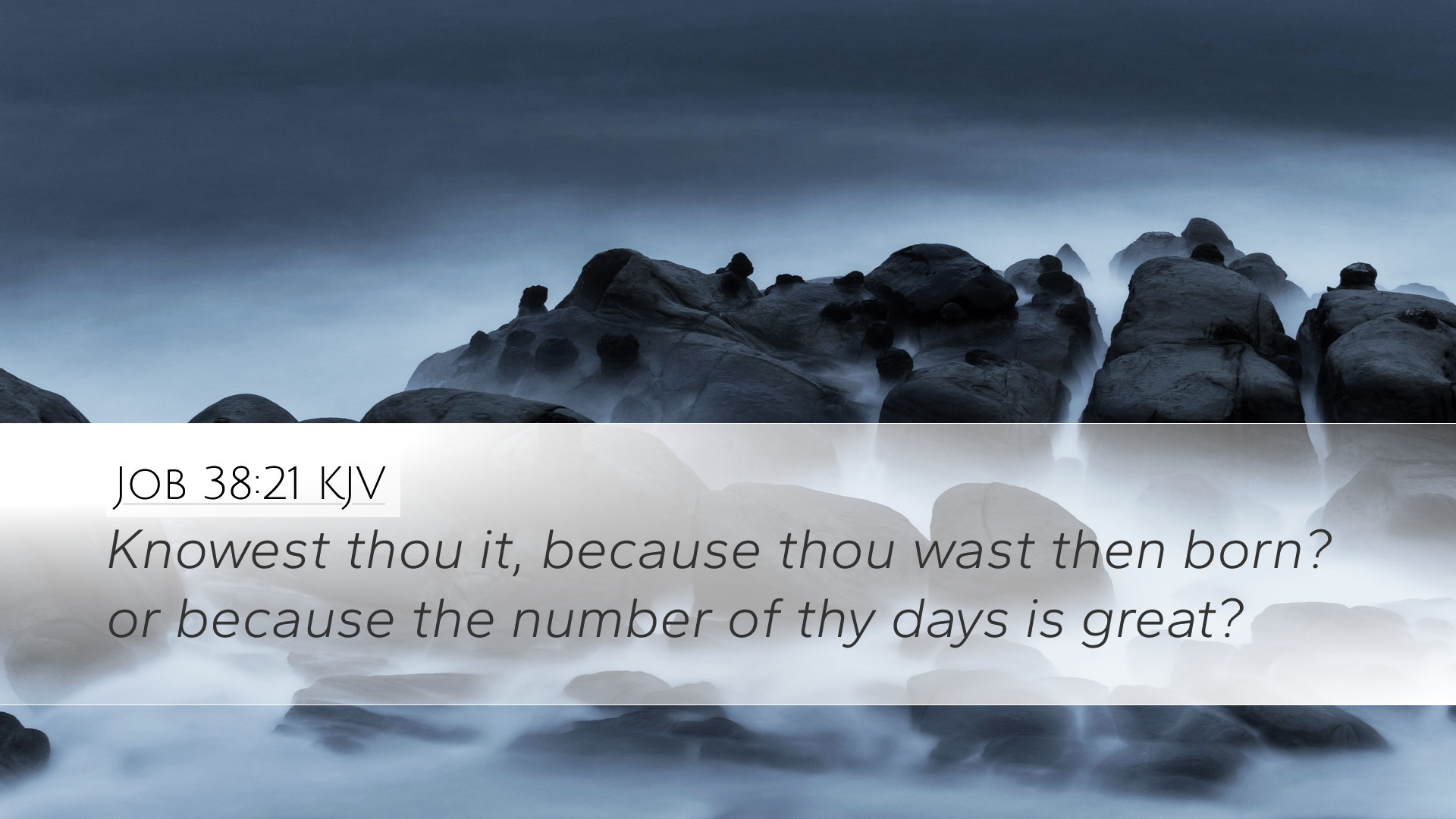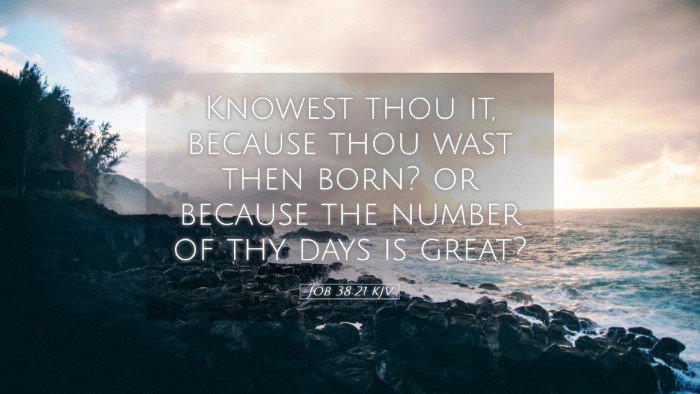Commentary on Job 38:21
“Knowest thou it, because thou wast then born? or because the number of thy days is great?” (Job 38:21)
Context and Overview
The book of Job explores profound themes of suffering, divine sovereignty, and the human condition. In chapter 38, God begins to respond to Job, who has been questioning the reasons for his suffering and seeking understanding. God's response, framed in rhetorical questions, highlights Job's limited understanding of the cosmos and divine wisdom.
Insights from Matthew Henry
Matthew Henry emphasizes God's omniscience and the absurdity of Job's questions in light of God's vast knowledge. He notes that God challenges Job's comprehension of the world's workings, indicating that true wisdom is beyond human grasp. Henry remarks:
- The Limitations of Human Understanding: Henry explains that Job’s inquiries stem from a misunderstanding of his own position relative to God's sovereignty. God’s use of questions demonstrates that human beings often see only a fraction of the truth.
- God's Authority: He asserts that God’s authority over creation serves as a reminder of His ultimate power and purpose, which cannot be fully comprehended by mankind.
Insights from Albert Barnes
Albert Barnes provides a thorough examination of the implications of God's inquiry to Job. He highlights a few critical points:
- The Rhetorical Nature of the Question: Barnes notes that the question posed to Job is rhetorical, reinforcing the idea that understanding greatness and creation requires an existence that Job does not possess.
- The Age of the Universe: The inquiry about Job's birth suggests that one’s life experience and time on Earth are insufficient to grasp the divine intricacies of creation.
- Human Perspective: Barnes elaborates that the challenge to Job's knowledge reflects the broader human tendency to presume upon God’s wisdom and plan without recognizing our creaturely limitations.
Insights from Adam Clarke
Adam Clarke offers a critical perspective on God's query, driving deeper into the rhetorical elements and their implications for understanding God's creation.
- The Nature of Wisdom: Clarke comments on the divine wisdom that governs the universe, which is infinitely beyond human knowledge. He suggests that the greatness of God's wisdom and power is portrayed as a stark contrast to Job’s situation.
- Consciousness of Existence: He points out that God's question illustrates that human beings often lack awareness of their origin and the enormity of God's creation, further emphasizing the grandeur of the Creator.
- The Importance of Humility: Clarke underscores the lesson of humility that emerges from this verse—recognizing our limitations is essential for proper submission to God’s will.
Theological Implications
Job 38:21 invites readers to explore several theological themes relevant to pastors, students, and scholars:
- The Nature of God: This verse reveals God's transcendence and incomprehensibility. It emphasizes that divine understanding extends beyond human experience, reflecting God’s eternal wisdom.
- The Role of Suffering: Understanding suffering through God’s perspective helps believers grapple with their struggles. It's a call to trust God’s overarching goodness and purpose.
- The Human Condition: Job 38:21 makes the theological statement about human limitations. It calls for humility in recognizing that our knowledge is finite and that we are part of a greater divine plan.
Application for Life and Ministry
In application, Job 38:21 encourages believers to adopt an attitude of humility before God:
- Encouraging Trust in God: Pastors and leaders can use this verse to remind congregations to trust in God's wisdom, particularly in times of uncertainty or distress.
- Fostering Humble Inquiry: For students and scholars, engaging with the text should involve a humble approach to biblical study, recognizing limitations while pursuing truth.
- Emphasizing a Proper Understanding of Suffering: This passage can lead discussions on how to interpret and make sense of suffering in the light of God’s sovereignty.
Conclusion
Job 38:21 serves as a profound reminder of the vastness of God's wisdom compared to human understanding. Through the collective insights of Matthew Henry, Albert Barnes, and Adam Clarke, we grasp a deeper appreciation of God's dominion and our finite nature. This verse challenges believers to approach God with reverence, humility, and faith, trusting that even in suffering, His overarching purpose is unfolding in ways we may not fully comprehend.


